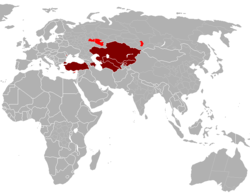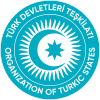International Organization of Turkic Culture
Uluslararası Türk Kültürü Teşkilatı (TÜRKSOY) International Organization of Turkic Culture | |
|---|---|
 Sovereign (maroon) and other members (red) of TÜRKSOY. | |
| Headquarters | |
| Official language | Turkish |
| Members[1] |
|
| Leaders | |
• General Secretary | Dusen Kaseinov |
| Establishment | 1993 |
Website http://www.turksoy.org.tr | |
The International Organization of Turkic Culture (Turkish: Uluslararası Türk Kültürü Teşkilatı, TÜRKSOY) is an international cultural organization of countries with Turkic populations, speaking languages belonging to the Turkic language family. Other than being an abbreviation of the former official name "Türk Kültür ve Sanatları Ortak Yönetimi" - Joint Administration of Turkic Culture and Arts, "Türksoy" is a compound noun, in Turkish, made up of the words "Türk" (Turk/ic) and "soy" (ancestry).
The General Secretary of TÜRKSOY is Duisen Kaseinov, former Minister of Culture of Kazakhstan. TÜRKSOY has its headquarters in Ankara, Turkey.
History
The organization has its roots in meetings during 1992 in Baku and Istanbul, where the ministers of culture from Azerbaijan, Kazakhstan, Kyrgyzstan, Uzbekistan, Turkey, and Turkmenistan declared their commitment to cooperate in a joint cultural framework. TÜRKSOY was subsequently established by an agreement signed on July 12, 1993 in Almaty.
In 1996, an official cooperation between TÜRKSOY and UNESCO was established, involving mutual consultations and reciprocal representation.[2]
It is announced that TÜRKSOY will be integrated into the Turkic Council, a geopolitical organization of Turkic countries established on November 3, 2009.
Members
As of 2016, TÜRKSOY has six sovereign member states and two non-sovereign observer states.[1]
| Member state | Language | Notes |
|---|---|---|
| Azerbaijani | ||
| Kazakh | ||
| Kyrgyz | ||
| Turkish | ||
| Turkmen | ||
| Uzbek | ||
| Observer state | Language | Notes |
| Gagauz | an autonomous region of Moldova. | |
| Turkish | a de facto independent republic recognized only by Turkey; see Cyprus dispute. |
Past members
| Observer state | Language | Notes |
|---|---|---|
| Altay | a federal subject of Russia. | |
| Bashkir | a federal subject of Russia. | |
| Khakas | a federal subject of Russia. | |
| Sakha (Yakut) | a federal subject of Russia. | |
| Tatar | a federal subject of Russia. | |
| Tuvan | a federal subject of Russia. |

Activities
TURKSOY carries out activities to strengthen cultural ties between Turkic peoples. One of the main goals to transmit their common cultural heritage to future generations and promote it around the world.[3]
Activities and events include;[3]
- Gatherings of artists, photographers, painters, opera singers, poets, journalists, theatre, dance and music ensembles of the Turkic World.
- Monthly journal published in three languages,
- Works written in various languages and Turkic dialects.
- Commemoration of artists, authors, poets and scholars in recognition of their valuable contribution to Turkic culture
- Symposia and conferences covering topics on the common history, language, culture and art of Turkic peoples
- Nevruz Day celebrations including concerts and events held in the UNESCO Headquarters in 2010, the United Nations General Assembly Hall in 2011, and various other countries including Germany, Austria and the UK
Cultural Capital of the Turkic World
Every year, one city in the Turkic world is selected as the "Cultural Capital of the Turkic World". Within the framework of events to celebrate the Cultural Capital of the Turkic World, numerous cultural events are held, gathering artists, scholars and intellectuals, giving them the opportunity to exchange their experiences, as well as promoting the city in question internationally.[4]
Recent cities that have been awarded this title are;[3]
- 2012: Astana in Kazakhstan
- 2013: Eskişehir, in Turkey
- 2014: Kazan in Tatarstan
- 2015: Merv in Turkmenistan
- 2016: Shaki, Azerbaijan[4]
Funding
TURKSOY is funded by contributions paid by individual member states, local governments, universities and NGO's.[3]
References
- ^ a b TURKSOY Official Web Site (2009). "Homepage > TÜRKSOY > Member States". Retrieved 2009-12-04.
- ^ UNESCO Web Site (1996). "Relations with the Joint Administration of the Turkic Culture and Arts (TÜRKSOY), and Draft Agreement between that Organization and UNESCO" (PDF). Retrieved 2009-12-04.
- ^ a b c d POLAT, Orhan. "About :: TURKSOY". www.turksoy.org. Retrieved 2016-05-17.
- ^ a b POLAT, Orhan. "Cultural Capital of the Turkic World 2016: Sheki :: TURKSOY". www.turksoy.org. Retrieved 2016-05-17.
External links


